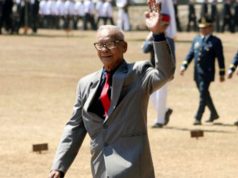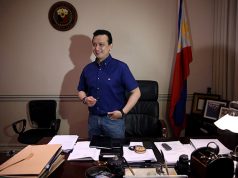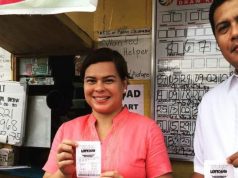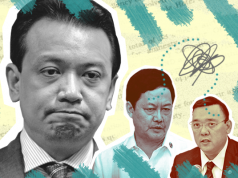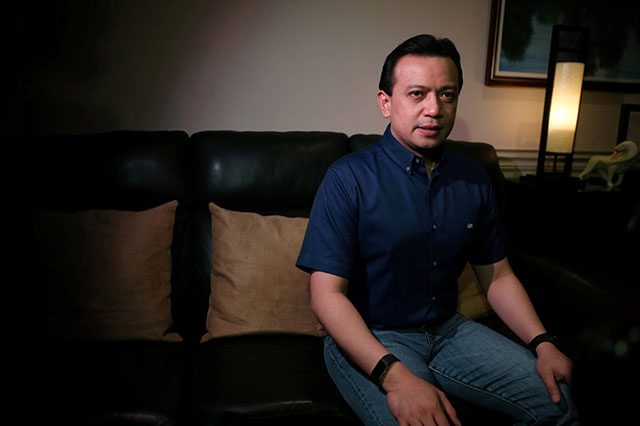
The Makati Regional Trial Court’s order of the arrest of Sen. Antonio Trillanes IV has been criticized by a number of legal experts and political critics alike.
In his resolution for warrant, Judge Elmo Alameda of the Makati RTC Branch 150 wrote that President Rodrigo Duterte’s Proclamation 572 nullifying the amnesty granted to the former mutineer and ordering his arrest was valid.
He also argued that Trillanes “failed to convince the Court that he indeed complied with the minimum requirement” in applying for amnesty.
Rejected by the Makati court
Alameda’s order rejected the evidence Trillanes submitted to prove that he complied with the required application, which included a photograph of him holding the application form and an affidavit from Col. Josefa Berbigal, a former National Defense official, confirming she had received the application.
It also said that Trillanes had failed to present the original application or even a duplicate or a photocopy showing he personally accomplished the application for amnesty.
Among the evidence submitted were “barren of probative weight to prove compliance by Senator Trillanes of the minimum requirements set forth in the rules and procedures in the processing of amnesty application,” the order read.
The order was made even after media footage of Trillanes filing his amnesty application in 2011, circulated in the days after Duterte’s revocation of the amnesty granted to the 47-year old lawmaker by the previous administration.
The Department of Justice earlier this month said that the missing application form formed the basis of the action taken against Trillanes, as it could not be proved that he had applied for amnesty, which is a requirement under the law.
Legal debates sparked
Critics in the legal profession, including those from the opposition, have criticized the the Makati court’s move.
Some have criticized it for shifting the burden of proof to the defendant Trillanes to prove his innocence.
Judge Alameda said that Trillanes should show to the court the amnesty application he filed.
The problem with that position of Alameda is that he shifted the burden of proof to Trillanes contrary to the presumption of regularity in the performance of duties by govt. officials. https://t.co/Be19eDYdxD
— Legalist (@junjijayme165) September 26, 2018
What confuses me is, why was the burden of proof was w/ Trillanes, when Lorenzana stated in a quick interview that Calida asked him to get Trillanes’ amnesty, which he provided. Then weeks later, PP 572 declares @TrillanesSonny’ amnesty ab initio because he “did not file for it?” https://t.co/bNtvidx6Fs
— GLP (@IAmGuammer) September 25, 2018
The Supreme Court in cases such as People v. Ganguso has held that the burden to prove the guilt of the accused lies with the prosecution, and failure to prove his guilt should lead to acquittal.
One law student meanwhile argued that the decision against Trillanes went against the legal doctrine that substantive law must always be favored over procedural law by rejecting the evidence he presented.
1. Procedural law vs. Substantive law
The former is generally bound by the rules of proceedings, and is inferior to the latter, which is made by the Legislature.
Between the two, it is substantive law which must always be favored.
— leiron (@leiron) September 25, 2018
The 2005 decision in PAGCOR v. Angara is one of the cases that explains why substantive law has been traditionally favored over procedure.
“A strict and rigid application of the rules must always be eschewed when it would subvert the primary objective of the rules, that is, to enhance fair trials and expedite justice. Technicalities should never be used to defeat the substantive rights of the other party,” wrote the late associate justice Alicia Austria-Martinez in the case.
Some have questioned whether the decision properly applied the rules on evidence and respected the jurisdiction of the high court.
Sigh. So many problems with this.
1. By requiring Sen. Trillanes to produce a copy of his application form, Judge Alameda had in effect adopted the DoJ/SolGen theory – which itself is the subject of a petition for certiorari before the Supreme Court.
— Jego J.G.M. Ragragio (@JegoRagragio) September 25, 2018
Presidential spokesperson Harry Roque on Wednesday said that the president had kept his promise of following the rule of law by approaching a civilian court instead of forcibly ordering authorities to arrest Trillanes.
“We have to abide by the rule of law. We abided by it, we expect the Senator to do nothing less,” he said in an interview with CNN Philippines.
Trillanes has posted the P200,000 bail set by the judge and has since then been released from custody. He condemned the president’s alleged obsession with him and the death of democracy.




